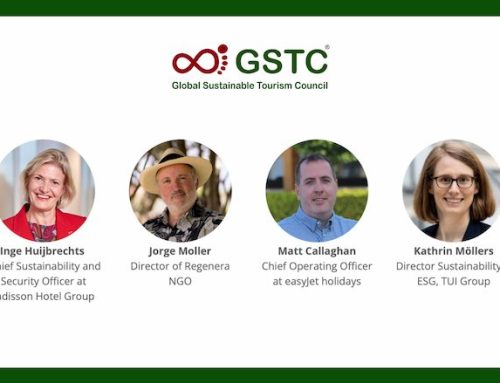(September 22nd, 2015) – The Wildlife Friendly Enterprise Network (WFEN) is a global community formed around showcasing, recognizing and sharing the stories of great conservation enterprises around the world – enterprises that are win-win-wins for people, planet and profit through the certification of products. WFEN’s effective conservation model can be attributed to their collaborative efforts with various tourism and government stakeholders and the application of GSTC Tour-Operators Criteria alongside best practice methods.

Guhonda , the oldest and largest Silverback Mountain Gorilla in Volcanoes National Park, Rwanda. Credit: Julie Stein.
The organization defines Wildlife Friendly® Tourism as, “Tourism that truly supports conservation of wildlife and habitat along with economic incentives for communities to support both.” Their innovative work is most recently exemplified by their new certification linking the GSTC Criteria directly to wildlife conservation methods.
Gorilla Friendly™ Tourism Certification
The Gorilla Friendly™ Tourism certification was first applied to Mountain Gorillas in the three range states: Uganda, Rwanda and Democratic Republic of Congo through a partnership with the International Gorilla Conservation Programme (IGCP) – one of the oldest and most respected organizations working on the conservation of critically endangered Mountain Gorillas. Primary funding was provided by World Wildlife Fund-Sweden, a coalition partner of IGCP. The new certification standard was built using a combination of IUCN Best Practices and GSTC Tour Operators Criteria jointly.
Mountain Gorilla tourism is widely considered to be one of the most successful wildlife related tourism projects in the world – both in terms of its economic importance to the GDP of the three countries where the Gorillas live but also for the long-term survival of this iconic species. According to the WFEN’s Website, “Mountain Gorillas and tourism are inextricably linked. Arguably, neither has a future without the other…” creating an obvious need for the development of the ‘Gorilla Friendly™ Tourism label – A first-of-its kind species-focused tourism certification.
The timeframe to develop the certification required three years of stakeholder consultation with governments, communities and the private sector of the three Mountain Gorilla range states. WFEN is now now finalizing the final draft of their standards which will apply to the National Parks and Rangers, Hotels and Lodges, Tour Operators and Travel Agents.
Growing Application of GSTC Criteria
Moving forward, WFEN is applying their new certification to other threatened wildlife including Sea Turtles – which interface with tourism and tourists in the marine environment as well as on beaches around the world.
The first part of the effort has been developed by Dr. Kimberly Stewart, Sara Ramirez, and the St. Kitts Sea Turtle Monitoring Network (SKSTMN) (St. Kitts is an Early Adopter of the GSTC Criteria) together with stakeholders on St. Kitts and Nevis through a grant from Global Environmental Facility Small Grants Programme (GEF-SGP), and will be piloted on St. Kitts incorporating some of the GSTC criteria together with expert input on Sea Turtles.
WFEN is a member of the conservation Network WIDECAST which partners with the United Nations Environment Programme (UNEP) in the Caribbean Sea. WIDECAST is comprised of more than 60 Country Coordinator (CC) residents in 43 Wider Caribbean nations and territories. Each CC works closely with an active national coalition of governmental and non-governmental stakeholders, including scientists, natural resource managers, conservationists, policymakers, educators and others. A critical baseline for WFEN is that these efforts are developed for a local context and can then be adapted for at a global scale for far ranging species like the Sea Turtle.
GSTC Criteria
The Global Sustainable Tourism Council (GSTC) establishes and manages global sustainable standards with the aim of increasing sustainable tourism knowledge and practices among public and private stakeholders. At the heart of our work are the Global Sustainable Tourism Council’s Sustainability Criteria. There are two sets of GSTC Criteria: Destination Criteria (GSTC-D) and Hotel & Tour Operator Criteria (GSTC-H&TO). These are the guiding principles and minimum requirements that any tourism business or destination should aspire to reach in order to protect and sustain the world’s natural and cultural resources, while ensuring tourism meets its potential as a tool for conservation and poverty alleviation. Sustainability is imperative for all tourism stakeholders and must translate from words to actions.





